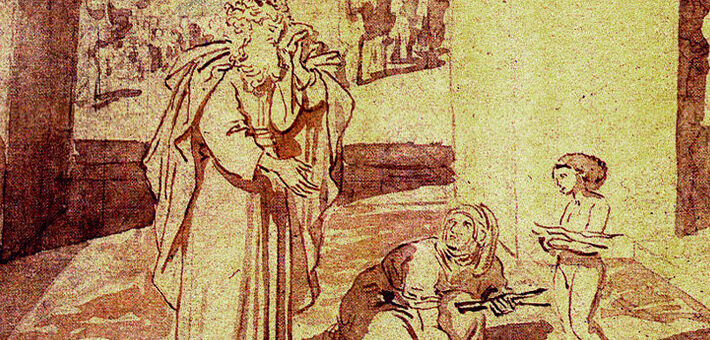Commentary on Luke 7:11-17
The author of Luke-Acts presents to Theophilus, the lover of God (could that be us?), an orderly account designed to explore and answer the question, “Who then is this?” (Luke 8:25).
Who is this man Jesus? What difference does he make in our lives? How are we to make sense of his story and all that he said and did? Perhaps those were the questions asked by Theophilus; they are certainly our questions.
We have heard that Jesus was able to heal the slave of a Roman centurion without even meeting the dying man. And he even praised the faith of a pagan. What kind of rabbi is he? How does he dare have anything to do with the unclean? We will return to that theme next week. But this week Jesus’ healing powers are put to the test and we see echoes of the prophets in this fascinating moment that is told only by the author of Luke-Acts.
Nain (today the largely Arabic town of Nein) is in the Galilee about 5 miles southwest of Nazareth and 25 miles from Capernaum where Jesus had just healed the slave. Why Jesus is going to Nain is not clear. But what we are told is that a large crowd is following Jesus. The word was spreading about this worker of miracles.
As Jesus and his crowd approach the town a crowd going out of the city meets them. A man of the town has died and villagers are accompanying his mother out to the cemetery for his burial. We are told that his mother is a widow and he was her only son. This tells us much about her now precarious status. Whether or not this woman had any daughters would not matter. Without either a husband or son she was in a difficult position financially. She would not have a source of income.
We should also lift up the fact that her grief is raw. According to Jewish burial laws she would have to bury her son within twenty-four hours of his death. That tells us that her son had just died. Surrounded by neighbors she is walking in pain and sorrow. One can only imagine the thoughts that were racing through her head — “What will happen to me? How will I survive without my son?” It is not unreasonable to think that this unnamed widow would not have noticed Jesus or the crowd surrounding him. She was wrapped in the fog of despair.
Before we look at Jesus’ amazing gift to this woman, we need to be reminded of two other stories of women and their sons. When Jesus preached his first sermon in Nazareth, angering his neighbors, he reminded them of the fact that the great prophet Elijah helped not the widows of Israel, but a widow at Zarephath (Luke 4:25-26). Sent by God into the land of Sidon to escape the wrath of Ahab and Jezebel, he was to be fed by a widow. How was this woman to feed this man? She had only a small bit of oil and meal left. Notice how the prophet meets this widow at “the gate of the town” (I Kings 17:10). After saving the woman and her son from starvation the woman’s son falls ill and dies. She cries out, “What have you against me, O man of God? You have come to be to bring my sin to remembrance, and to cause the death of my son” (I Kings 17:18). Crying out to God and covering the child with his body three times, Elijah resuscitated the boy.
After picking up the mantle of his teacher, the prophet Elisha also was able to return a dead child to a woman who sought his help. Like Elijah, he lay on the child and the child became warm. The prophet then walked around the room and bent over the child once more and the child “sneezed seven times,” a sure sign of life (2 Kings 4:35). These stories tell us, as the widow of Zarephath declared; “Now I know that you are a man of God, and that the word of the Lord in your mouth is truth” (I Kings 17:24).
We are outside the gate of a town once more. Again, a man of God meets a widow. While there are direct references to I Kings 17 this exchange is far different. Jesus sees the widow and knows her situation. He seems to know that this was her only son. Jesus does not wait for her to approach him. He enters into this most private of moments and stops the funeral procession. What would be your reaction if a stranger walked in during the funeral of one of your parents and stopped the proceedings?
The author most definitely wants the readers to recall the stories of Elijah and Elisha, but unlike the prophets who had to touch the dead boys, this man who is a far greater prophet need only touch the bier on which the dead man lies. He does not cry out to God. Rather, he only has to tell the man to rise and the man sits up and begins to speak. Elijah “gave him to his mother” (I Kings 17:23), and Jesus “gave him to his mother” (Luke 17:15). Then like the widow, the crowd who witnessed this resuscitation declared, “A great prophet has risen among us!” (Luke 17:16).
The sick are made well, the dead return to life, all signs helping the crowds, helping us, to understand whom this man of God truly is. It would seem that disciples of John the Baptizer were in this crowd for they returned to John and reported these amazing events. John had told the crowds that “one who is more powerful than I is coming” (Luke 3:16). They are left to wonder, “Are you the one who is to come?” (Luke 7:19).
This is a wonderful story, but it is not easy for us to hear because so many of us have been in the position of the widow. We have lost people we dearly love, and there was not a prophet to touch their bier and bring the dead back to life. We are invited to reflect upon how Jesus continues to heal our pain and our sorrow as we look toward the gift of eternal life.


June 5, 2016